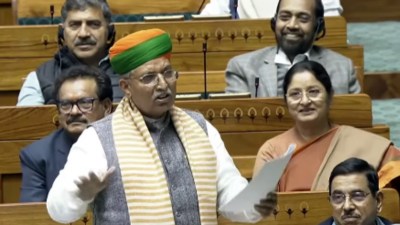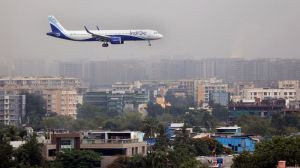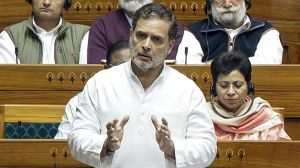Explained: What does designation as a ‘state sponsor of terrorism’ by the US mean?
Ukraine’s President Volodymyr Zelenskyy has asked President Joe Biden to designate Russia as a “state sponsor of terrorism”. What does this mean, and what impact will it have? Which countries are on this list?
 Ukrainian President Volodymyr Zelenskyy in his office in Kyiv, Ukraine, Saturday, April 9, 2022. (AP Photo/Evgeniy Maloletka)
Ukrainian President Volodymyr Zelenskyy in his office in Kyiv, Ukraine, Saturday, April 9, 2022. (AP Photo/Evgeniy Maloletka)
Ukraine’s President Volodymyr Zelenskyy has asked President Joe Biden to designate Russia as a “state sponsor of terrorism”, which would activate perhaps the harshest suite of sanctions available with the United States against the government of President Vladimir Putin.
This was first reported by The Washington Post, which said Zelenskyy made the request “during a recent phone call with Biden that centred on the West’s multifaceted response to Russia’s invasion of Ukraine”.
Biden did not commit to any specific actions, but told Zelenskyy that he was “willing to explore a range of proposals to exert greater pressure on Moscow”, ‘The Post’ reported.
Terrorist designation
The US Secretary of State (the minister primarily in charge of foreign relations) has the power to designate countries that “have repeatedly provided support for acts of international terrorism” as “State Sponsors of Terrorism”.
According to the State Department website, the US can place four categories of sanctions on countries that are on this list: restrictions on US foreign assistance; a ban on defence exports and sales; certain controls over exports of dual use items; and miscellaneous financial and other restrictions.
Sanctions can also be placed on countries and persons that engage in certain trade with designated countries.
Countries on the list
As of now, there are four countries on the list of state sponsors of terrorism.
The first to be designated among them was Syria (December 29, 1979), followed by Iran (January 19, 1984), and North Korea (November 20, 2017). Cuba was re-designated as a state sponsor of terrorism on January 12, 2021.
A Congressional Research Service (CRS) brief prepared for members and committees of the United States Congress in May 2021 clarifies that “a terrorism designation is but one part in the bilateral relationship between the United States and each of these governments.”
Countries can be put and taken off the list from time to time. A country can be de-listed if it is deemed by the US to have reformed its behaviour and returned to complying with the requirements of international law and conduct, or if it has undergone a change of leadership.
So, in October 2020, President Donald Trump announced that the US was taking Sudan, which was first designated under President Bill Clinton in 1993, off the list of state sponsors of terrorism.
Iraq was removed from the list first in 1982, before being re-listed in 1990, and again removed in 2004.
South Yemen was removed in 1990, when it merged with North Yemen, and Libya was removed in 2006.
Cuba was first designated in 1982. In 2014, President Barack Obama announced he would reestablish diplomatic relations with Cuba and ease diplomatic and economic restrictions, and on May 29, 2015, Secretary of State John Kerry delisted the government of Cuba. Trump turned the clock back, and in the dying days of his administration, Secretary of State Michael Pompeo last year designated Cuba once again as a supporter of acts of international terrorism.
Statutes authorising designation
There are currently three statutes that authorise the Secretary of State to designate a foreign government for repeatedly providing support for acts of international terrorism: (i) Section 620A of the Foreign Assistance Act of 1961, which prohibits the transfer of most aid; (ii) Section 40 of the Arms Export Control Act (AECA), which prohibits exports, credits, guarantees, other financial assistance, and export licensing overseen by the State Department; and (iii) Section 1754(c) of the Export Controls Act of 2018.
According to the CRS brief, of these three statutes, only the AECA identifies objectionable activities as part of the definition. While none of the three Acts defines the overarching term “international terrorism,” the AECA says that the term includes:
“…All activities that the Secretary determines willfully aid or abet the international proliferation of nuclear explosive devices to individuals or groups, willfully aid or abet an individual or groups in acquiring unsafeguarded special nuclear material, or willingly aid or abet the efforts of an individual or group to use, develop, produce, stockpile, or otherwise acquire chemical, biological, or radiological weapons.”
Impact of designation
In an Op-Ed written for The Los Angeles Times on March 1, 2022, Jason M Blazakis, who was director of the State Department’s Counterterrorism Finance and Designations Office in the Bureau of Counterterrorism from 2008 to 2018, said “adding Russia to the state sponsors of terrorism list would be the nuclear economic option and a precision strike against Putin’s ego”.
There was “no anvil within the sanctions world as economically blunt as the US government’s “state sponsors of terrorism” designation”, Blazakis wrote. He listed the major ways in which the designation can potentially hurt the target country’s financial system:
“* freezing of the country’s assets in the United States, including real estate;
* requiring the US to veto efforts of that country to secure World Bank or International Monetary Fund loans;
* prohibiting a wide variety of dual-use exports;
* requiring the US to take economic action against countries that continue to do business with the targeted country.”
Designation as a state sponsor of terrorism would deal blows to Putin’s “reputation” and “grand hope”, from which he “would be unlikely to recover”, Blazakis wrote.
Newsletter | Click to get the day’s best explainers in your inbox
- 01
- 02
- 03
- 04
- 05







































